-

新人教版高中英语必修2Unit 4 History and Traditions-Listening&Speaking&Talking教案二
Listening and Speaking introduces the topic of “Take part in a youth project”. The listening text is an interview about "sharing views on historical sites". Through listening to a dialogue between Chinese and foreign students on the way to the Confucius Temple, students can understand their views on the Confucius Temple, Confucius, Confucius' descendants and Confucius' educational thoughts, so as to realize and think about the profound influence of Confucius and his thoughts on Chinese historical tradition. At the same time, the dialogue naturally integrates English idioms and mentions Shakespeare, the British playwright, so as to provide language materials and context for students to understand English idioms and related cultural allusions, as well as to compare Chinese and foreign cultures, which is helpful for students to understand and express the language such as history, tradition, culture and custom significant impact.Text analysis: listening text is a dialogue between a British student and a Chinese student when he goes to the Confucius Temple. When William, a British student, visited the Confucius Temple, he asked Xiao Kong, a Chinese student, for directions. Xiao Kong was just going to the Confucius Temple to meet with the members of the research group, so they went together and exchanged their views on the Confucius Temple, Confucius, Confucius' descendants and Confucius' educational thoughts. From the perspective of foreign tourists, this paper describes their thoughts on Confucius, the great son of Confucius, who had a profound impact on Chinese history and cultural tradition, and his education.Listening and Talking introduces a visit to a historic tourist destination. Tourism is a common way to understand a country's history, culture, and customs and so on. Students listen to the dialogue between Xiao Yan, a youth hostel Usher, and Paul, a backpacker, to learn about Pingyao's famous historical and cultural attractions and Paul's travel experience and experience as a foreign tourist.

新人教版高中英语必修2Unit 4 History and traditions教案
这个地区有着深厚的传统。既学既练:为了让更多的外国游客了解中国文化,欣赏中国美丽的自然风光,感受中国发生的巨大变化,某外文杂志社将出版一本英语小册子来介绍中国的旅游景点。该杂志社邀请你为该小册子写一篇英语短文来介绍杭州,内容包括:1.杭州的位置(中国东南部)、面积(16 000多平方公里)及历史(2 200多年)等;2.杭州的旅游特色(自然风景、传统文化、特色小吃等);3.希望更多的游客来杭州参观。注意:1.词数80左右;2.可适当增加细节,以使行文连贯。Located in the southeast of China, Hangzhou is a beautiful city.Dating back more than 2,200 years, Hangzhou covers an area of more than 16,000 square kilometers.In Hangzhou, you can visit the West Lake, whose scenery is fascinating.In addition, you can’t miss its cultural relics and historical sites, from which you will learn more about excellent Chinese traditional culture and traditions.In Hangzhou, the special snacks are famous and visitors from different parts of the world think highly of them.As a tourist attraction, Hangzhou attracts a large number of visitors from home and abroad every year.Once you come to China, Hangzhou is a scenic spot you can’t miss.

新人教版高中英语必修2Unit 5 Music-Discovering Useful Structures教案二
4. When he got absorbed in his world of music, he felt as if he could “see” the beauty of the world around him, like he had in his previous life.P·P as adverbial: _________________________________________________________________.Function: _______________________________________________________________________.Step 5 Solid Complete the passage with the words in brackets in their correct forms.Well known as a successful band, the Impact members show quite a few striking qualities. They never ever give up. When _____________(question) by the media, they are not _____________(discourage) and practise even harder. They are improving themselves by attending several master training class. They are united. _____________(fill with) team spirit, they act as a whole, always aiming for glory. Step 6 Difference and similarity from -ingObserve the following examples.1. He went out, shutting the door behind him.=He went out, ________________________________________________________.2. Not knowing what to do, he went to his parents for help.=__________________________________________, he went to his parents for help.Similarity: _______________________________________________________________________________________________________________________________________________________.Difference : _______________________________________________________________________________________________________________________________________________________.Step Practice1. ________ in a hurry, this article was not so good. 因为写得匆忙, 这篇文章不是很好。2. ________ carefully, he found something he hadn’t known before. 他仔细读书时, 发现了一些从前不知道的东西。3. ________ why he did it, the monitor said it was his duty. 当被问及他为什么要这么做时, 班长说这是他的职责

新人教版高中英语必修2Unit 5 Music-Listening&Speaking&Talking教案
choir memberspeople to run food stands people to sell festival ticketspeople to sell music CDspeople to set up equipmentmusical performersStep 2: Listen to the announcement again and answer the questions. ? 1. What kind of songs will Grace Davis sing at the festival?? 2. Who can try out as a performer?? 3. What can those who think they do not have musical talent do?? 4. How can students volunteer to take part?? Talking about preferences:? Would you prefer doing ..?? What would you prefer to do?? Would you rather do .... or ….?? What would you rather do?? I'd prefer .... to ..? I'd rather have ... than .. Step 3: Speaking ProjectWork in groups. Role-play the conversation or make a new one.? Debbie: Where have you been? You missed the announcement about the music festival.? John: I was at the doctor's office. Music festival?? Frank: Yes, it's going to be next month on the school sports field. John, you can play the piano. How about playing it at the festival?? John: Well, I'd rather play the violin. I can play Liang Zhu.? Frank: Wow! Sounds good. What about you, Debbie? ? Debbie: Actually, I don't have much musical ability. I'd prefer just to help out with the crowds.? Frank: You can sell tickets or work at a food stand.? John: So can I assume that the aim of the festival is to raise money?? Debbie: Yes. All of the money will go to charity.

新人教版高中英语必修2Unit 5 Music-Discovering Useful Structures教案一
Step1:自主探究。1.(教材P52)Born(bear) in the USA on 2 January 1970, Whitacre began studying music at the University of Nevada in 1988.2.(教材P52) Moved(move) by this music, he said, “It was like seeing color for the first time.”3.(教材P56)I was very afraid and I felt so alone and discouraged(discourage).4.(教材P58)Encouraged(encourage) by this first performance and the positive reaction of the audience, I have continued to play the piano and enjoy it more every day.Step2:语法要点精析。用法1:过去分词作表语1).过去分词可放在连系动词be, get, feel, remain, seem, look, become等之后作表语,表示主语所处的状态Tom was astonished to see a snake moving across the floor.汤姆很惊讶地看到一条蛇正爬过地板。Finally the baby felt tired of playing with those toys.终于婴儿厌倦了玩那些玩具。注意:1).过去分词作表语时与被动语态的区别过去分词作表语时,强调主语所处的状态;而动词的被动语态表示主语是动作的承受者,强调动作。The library is now closed.(状态)图书馆现在关闭了。The cup was broken by my little sister yesterday.(动作)昨天我妹妹把杯子打碎了。2)感觉类及物动词的现在分词与过去分词作表语的区别过去分词作表语多表示人自身的感受或事物自身的状态,常译作“感到……的”;现在分词多表示事物具有的特性,常译作“令人……的”。
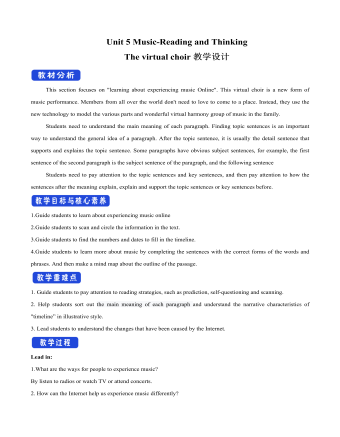
新人教版高中英语必修2Unit 5 Music-Reading and Thinking教案一
This section focuses on "learning about experiencing music Online". This virtual choir is a new form of music performance. Members from all over the world don't need to love to come to a place. Instead, they use the new technology to model the various parts and wonderful virtual harmony group of music in the family. Students need to understand the main meaning of each paragraph. Finding topic sentences is an important way to understand the general idea of a paragraph. After the topic sentence, it is usually the detail sentence that supports and explains the topic sentence. Some paragraphs have obvious subject sentences, for example, the first sentence of the second paragraph is the subject sentence of the paragraph, and the following sentenceStudents need to pay attention to the topic sentences and key sentences, and then pay attention to how the sentences after the meaning explain, explain and support the topic sentences or key sentences before.1.Guide students to learn about experiencing music online2.Guide students to scan and circle the information in the text.3.Guide students to find the numbers and dates to fill in the timeline.4.Guide students to learn more about music by completing the sentences with the correct forms of the words and phrases. And then make a mind map about the outline of the passage.1. Guide students to pay attention to reading strategies, such as prediction, self-questioning and scanning.2. Help students sort out the main meaning of each paragraph and understand the narrative characteristics of "timeline” in illustrative style.3. Lead students to understand the changes that have been caused by the Internet.

新人教版高中英语必修2Unit 5 Music-Reading for Writing教案二
The Internet celebrity Gao Yifeng. Years ago, he owned 5 companies and the staffs over 1,000, but during the economy crisis, he became nothing but debt. He was so worried that his hair became white overnight. There was a time when he wanted to killed himself. But after listening to the song Start Over by Liu Huan, he decided to cheer himself up. He started a steamed bun shop and gradually became a national chain shops. Now he became successful again.Walter Haddon said, “Music is the medicine of a troubled mind.” Music contains such a pleasant and inspiring force. Music gave him courage and bravery. When he listened to the song, it made his spirit fly like a kite in the wind. Music gave him strength and brought him relief. It was the rock I leant on to become strong and to get through those hard times. I hope none of us have to go through the same kind of suffering that he did. At the same time, we all go through various periods when we feel sad or alone. During those times, music can help us in the same way that it helped him. I hope we all will somehow begin to treasure music and make it a part of our life. Thank you for your listening !5.Revise your writing each other.Does he/she explain how music has changed his/her/someone else’s life?Are some of the rhetorical devices included and used properly ?Does he/she talk about how music makes him/her/someone feel?Is the first word in each sentences capitalised?Does he/she use correct punctuation ?
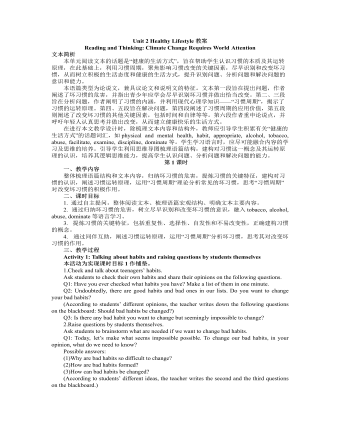
新人教版高中英语选修3Unit 2 Healthy Lifestyle教案
Activity 4: Figuring out the structure and the writing purpose 本活动为实现课时目标2。 1.Read Paragraph 6 and think about its main idea and the writer’s writing purpose. Q1: If you were the author, how would you end your article? “For young people, there is plenty of time to change bad habits. However, there is no “magic pill” or delete button that will help you; you have to think about your bad habits and decide on some changes. You have the power to build a happy and healthy life full of good habits!” Q2: What is Paragraph 6 mainly about? (Possible answer: to appeal to young people including teenagers to change bad habits and live a happy and healthy life.) 2.Think about the writer’s writing purpose and share opinions. Q1: What is the writing purpose? Work in pairs and figure it out. (Possible answer: On the one hand, the passage is written to help teenagers change their bad habits and live a healthy lifestyle. On the other hand, it provides us with a scientific way to identify and analyse our problems objectively, thus strengthening our resolve to tackle the seemingly common yet tough problems in our lives.) 【设计意图】 步骤1旨在预测和验证文章最后一段主要内容,梳理完整的语篇结构,步骤2旨在思考和讨论作者的写作目的。教师也可根据学生课堂反应情况融入对语篇人称多次转换的思考。
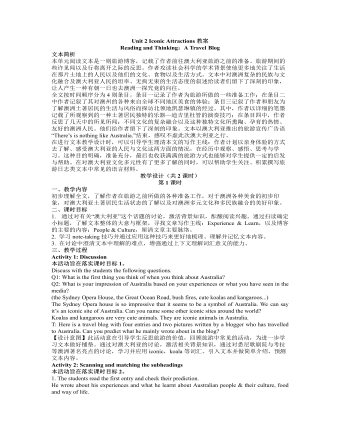
新人教版高中英语选修4Unit 2 Iconic Attractions教案
帮助学生通过讨论与对主题的提升,反思自己的旅游方式,以便做出更优化的安排,在今后的旅程中有更多的收益。 Activity 2: Further discussion of the 6 elements above and supplement of more background knowledge 本活动为实现课时教学目标2。 1.Target Q: The writer’s clear target of traveling, meeting the people and experiencing the culture, is closely related to his major in social studies. Then what is social studies? Social studies is a part of a school or college curriculum concerned with the study of social relationships and the functioning of society and usually made up of courses in history, government, economics, civics, sociology, geography, and anthropology. (Dictionary by Merriam-Webster) Reflection: When you go out to travel, what targets do you usually have in mind? 2.Research Q: Suppose you are traveling to Hangzhou during the school holidays, how will you do research on the city? (surf the internet, read books or travel brochures, consult friends, ...) What information will you be interested to know? (location, iconic sites, local cuisines, interesting customs, shopping malls ...) 3.Abandonment To make the most of time, we have to learn to abandon so that we can accomplish our plan. What will you be interested in doing if you go to Hangzhou if you have a week’s time? What if you only have 2 days? 4~5. Venturing & Experiencing Q: What did he venture to do during the trip? What new experiences did he have? In Sydney: attend his first open-air barbecue, enjoy many different but yummy meals In Catherine: observe the life and customs of the aborigines appreciate their music & try the musical instruments: the didgeridoo

人教版高中语文必修1《小狗包弟》教案2篇
巴金在十年浩劫中的大致经历:放弃包弟并没有换得保全一家人,1968年8月,巴金被关进牛棚改造,随后经受了大字报、挂牌游街等形式的批斗。1970年,到农村改造,掏大粪、喂猪、背稻草、种地……1972年,妻子萧珊在饱受精神折磨后患上癌症,病逝。巴金的儿子在劳动改造的过程中也饱受精神和肉体上的折磨,性格变得内向抑郁,疾病缠身。此时,巴金69岁。巴金曾在《病中》一文写道:“当姚文元拿着棒子的时候,我给关在牛棚里除了唯唯诺诺之外,敢于做过什么事情?十年间我不过是一条含着眼泪等人宰割的牛。”小结:(幻灯片12)社会是病态的社会,政治是高压的政治,人性是扭曲的人性。十年文革,十年浩劫,给多少人留下了累累不可弥合的精神创伤。即使一条小狗,也可能摆脱不了“文革”无情的迫害,比如包弟,比如艺术家邻居的小狗。

人教版高中语文必修3《劝学》教案2篇
五.研习第一段:1.诵读指导要处理好句中停顿2.请学生对照注释翻译本段重点词句:学不可以已已:停止。青,取之于蓝而青于蓝于:从;比。木直中绳中:zhàng符合,合于。虽有槁暴,不复挺者,揉使之然也有通又,揉通煣,以火烘木,使其弯曲。然:这样。翻译:故木受绳则直,金就砺则利,君子博学而日参省乎己,则知明而行无过矣。所以木材经墨线画过(再用斧锯加工)就直了,金属刀剑拿到磨刀石上(磨过)就锋利了,君子广博地学习并且每天对自己检验反省,就能智慧明达,行为没有过错了。3.本段是从哪个角度论述中心论点的?明确:本段是从学习的意义这个角度论述中心论点的。荀子认为人的知识、道德、才能都不是天生成的,而是后天不断学习获得的,学习的意义十分重大,所以学习不能停止。4.本段中几个比喻句是为了说明什么道理?学生讨论发言,教师明确:
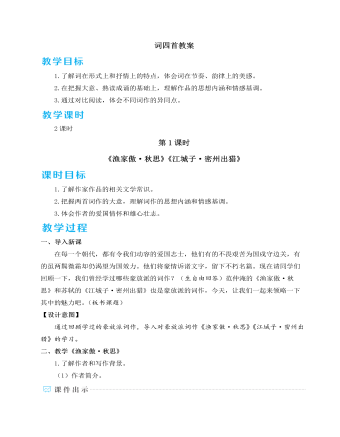
人教部编版语文九年级下册词四首教案
词人如此有违常规,造成了一种拗峭不凡的气势,词意更加纵横驰骋,抒情更加酣畅淋漓。2.如何理解《满江红》(小住京华)中的“俗子”?从这首词的语境来看,“俗子”当指词人的丈夫。这与“八年风味”的婚姻反思,与“青衫湿”的悲情是前后呼应的。秋瑾在后来写的一首《沁园春》中说:“有多少,遇王郎天壤,辜负才华。”在长篇弹词《精卫石》中说:“道韫文章男不及,偏遇个天壤王郎冤不冤。”这些词句,都是借谢道韫所嫁非人,间接抒发了她对婚姻的失望。王郎天壤(天壤王郎),是谢道韫鄙薄她丈夫王凝之的话,出自《世说新语·贤媛》:“一门叔父,则有阿大、中郎;群从兄弟,则有封、胡、遏、末,不意天壤之中,乃有王郎!”当然,从广义上理解,这首词中的“俗人”,也可泛指世俗之人。秋瑾到日本后写的《鹧鸪天》词中,有“祖国沉沦感不禁,闲来海外觅知音”的词句,可见“觅知音”意指寻求救国之道,不一定指个人的情感问题。
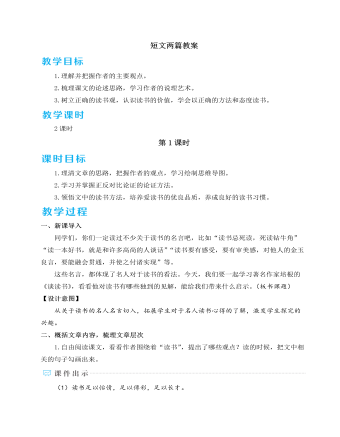
人教部编版语文九年级下册短文两篇教案
一、新课导入同学们,你们一定读过不少关于读书的名言吧,比如“读书忌死读,死读钻牛角”“读一本好书,就是和许多高尚的人谈话”“读书要有感受,要有审美感,对他人的金玉良言,要能融会贯通,并使之付诸实现”等。 这些名言,都体现了名人对于读书的看法。今天,我们要一起学习著名作家培根的《谈读书》,看看他对读书有哪些独到的见解,能给我们带来什么启示。(板书课题)【设计意图】从关于读书的名人名言切入,拓展学生对于名人读书心得的了解,激发学生探究的兴趣。二、概括文章内容,梳理文章层次1.自由阅读课文,看看作者围绕着“读书”,提出了哪些观点?读的时候,把文中相关的句子勾画出来。(1)读书足以怡情,足以傅彩,足以长才。(2)读书时不可存心诘难作者,不可尽信书上所言,亦不可只为寻章摘句,而应推敲细思。(3)书有可浅尝者,有可吞食者,少数则须咀嚼消化。(4)读书使人充实,讨论使人机智,作文使人准确。(5)读史使人明智,读诗使人灵秀,数学使人周密,科学使人深刻,伦理学使人庄重,逻辑修辞之学使人善辩:凡有所学,皆成性格。
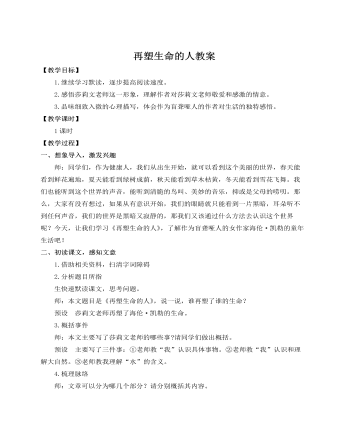
人教部编版七年级语文上册再塑生命的人教案
海伦·凯勒一岁多时不幸染上疾病,致使她双目失明、双耳失聪,随之又丧失了说话的能力。从此,她坠入了一个黑暗而沉寂的世界,陷入了痛苦的深渊。17岁,海伦·凯勒考进哈佛大学,还掌握了英、法、德、拉丁和希腊五种语言。大学期间,她开始写作。毕业后,她把自己的一生献给了盲人福利和教育事业,并在繁忙的工作中先后完成了14部具有世界影响的著作,最著名的是其自传《假如给我三天光明》。海伦·凯勒无比敬爱和感激自己的老师莎莉文,她说:“假如给我三天光明,我首先要长久地凝视我的老师——安妮·莎莉文!”海伦把自己的学习分成四个步骤:1.每天用三个小时自学。2.用两个小时默记所学的知识。3.再用一个小时的时间将自己用三个小时所学的知识默写下来。4.剩下的时间她运用学过的知识练习写作。在学习与记忆的过程中,她只有一个信念:她一定能够把自己所学习的知识记下来,使自己成为一个有用的人。她每天坚持学习10个小时以上,经过长时间的刻苦学习,她掌握了大量的知识,能熟练地背诵大量的诗词和名著的精彩片段。
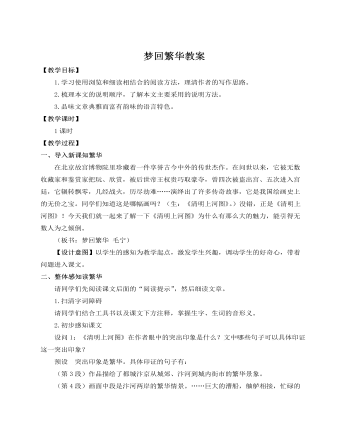
人教部编版语文八年级上册梦回繁华教案
设问2:第3段和第4段都写繁华,两段的区别是什么?预设 第3段是概括总写繁华景象,第4段则是具体描绘繁华景象。两段之间是从概括到具体的逻辑关系。【设计意图】通过细读课文,让学生在把握生字词的基础上对课文有初步的感知,可以用简单的词语概括作者所感知画面的整体特点,而且能够用文中具体的语句加以印证。以此训练学生自主把握文章重要信息的能力。三、自主探究寻繁华1.浏览课文,理清全文的说明顺序设问1:作者介绍了这幅画哪些方面的信息?在文中进行勾画批注,并说说文章可分为哪几个部分,概括主要意思。(生浏览勾画,批注交流)预设 文章分为三个部分:第1段:介绍这幅画作的创作背景,引出本文的说明对象——《清明上河图》。第2段:介绍了这幅画作的作者张择端及其创作动机。
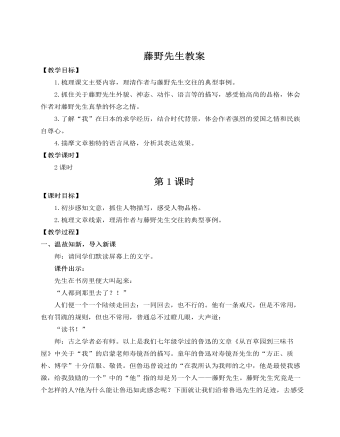
人教部编版语文八年级上册藤野先生教案
预设 清政府派遣这些留学生去国外留学,目的是学习国外先进的科学技术,回来报效国家,然而实际上他们在国外不学无术,忘记了自身使命和肩上的责任。作者在描写完留学生的这些丑态之后,采用了反语的手法,用一句话进行了总结——“实在标致极了”,仿佛是压抑不住的火山爆发,极尽讽刺之能事,酣发鄙夷、憎恶之胸臆。师:作者在这里采用了反语的手法,暗讽“清国留学生”们的丑态,除此之外,文中还有哪些地方运用了这种手法?预设 作者称日俄战争时的日本学生为“爱国青年”,说自己国内的论敌为“正人君子”,都是运用反语进行嘲讽。又如说日本对医学的翻译“并不比中国早”,说日本青年虽抗议托尔斯泰引用《新约》中的话,但他们“暗地里却早受了他的影响了”,都是话里有话,含义无穷的。【设计意图】此环节通过“咬文嚼字”,让学生学会从字里行间来品析文章深意,同时使学生进一步揣摩鲁迅先生“幽默讽刺、含蓄深蕴”的语言风格。
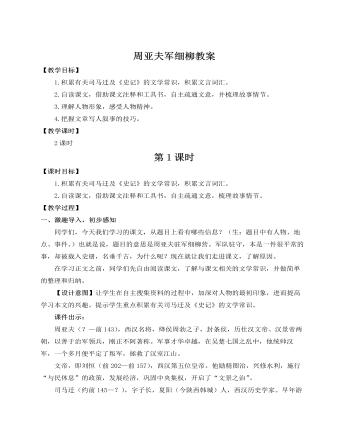
人教部编版语文八年级上册周亚夫军细柳教案
文帝之后六年,匈奴大入边。乃以宗正刘礼为将军,军霸上;祝兹侯徐厉为将军,军棘门;以河内守亚夫为将军,军细柳:以备胡。这一段主要围绕“大入边”之“大”来构建段落。整段文字看似与“大”无关,实则处处围绕“大”字做文章。写汉文帝三封将军“以备胡”,这是从内容上写胡人“入边”之“大”:边关吃紧,战势严峻。为了达到内容与形式的珠联璧合,司马迁在言语上连用三个“以……为……”的排比句式,以排山倒海的“声”势从言语上体现了“大”,以此增强文章的气势,形成一种“山雨欲来风满楼”的危急感。不仅如此,司马迁甚是在意言语细节。在连用三个“以……为……”时,打破言语的惯性,突然在第二个“以……为……”中省略了“以”字,这看似唐突,实则其心可鉴,省略第二个“以”字后,“以宗正刘礼为将军,军霸上;祝兹侯徐厉为将军,军棘门”不仅在视觉上间隔缩短,而且在朗读时彼此节奏加紧,联系更加紧密,军情更显危急,胡人“入边”之形势就显得更“大”了。而且,三个“以……为……”;“……为……”;“以……为……”之间张弛有度,一紧一松,营造了语势上的跌宕起伏,极具音韵之美。
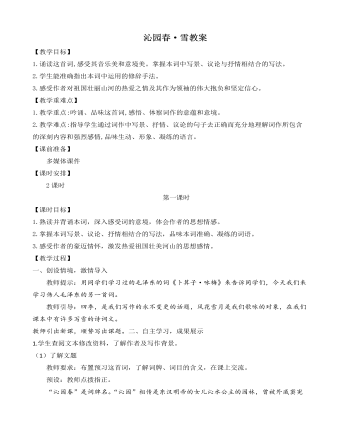
人教部编版语文九年级上册沁园春·雪教案
3. 同学们,我们再从表达方式方面去考虑一下。教师指正:写景、抒情、议论相结合。这是一首雄壮的抒情词作。上阕写景,气势磅礴、气象雄浑,而又寓情于景,句句洋溢着热爱祖国河山的豪情。下阕议论,由评论历史人物转到歌颂当代无产阶级英雄,抒发作者的豪情壮志。全词熔写景、议论和抒情于一炉,使主题鲜明突出,表现出强烈的艺术效果。五、 课堂检测,当堂反馈要求学生当堂做完下列题目,师生再共同订正,看看还有哪些知识没有掌握,教师及时要求学生巩固。六、知识迁移,拓展延伸1. 请同学们下面读一下柳宗元的《江雪》,回答后面的问题。教师:唐代著名文学家柳宗元写过的这首《江雪》,言简意深。请同学们思考分析,这首诗与《沁园春·雪》在感情基调上有什么不同?是什么原因造成的? 教师指正:柳宗元因参加革新运动失败而遭贬,他的政治思想和远大抱负不能实现,内心的苦恼与愤懑反映在诗中,就是那个卓尔不群、孤芳自赏、“独钓寒江雪”的“蓑笠翁”。而毛泽东的词作大气磅礴,格调高亢,充满了热爱祖国河山、以天下为己任的豪情壮志。这种差别,主要是由于作者所处的时代、境遇,特别是胸怀的阔狭造成的。
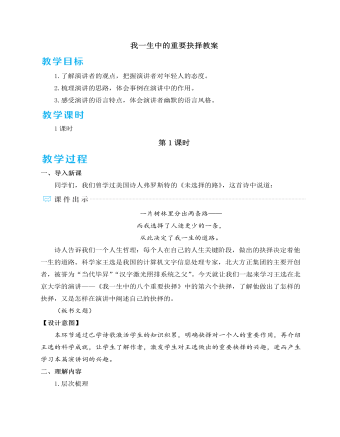
人教部编版语文八年级下册小石潭记教案
结束语:怀才不遇的柳宗元,他像陶渊明一样“采菊东篱下,悠然见南山”,也像吴均一样“从流飘荡,任意东西”,面对“凄神寒骨,悄怆幽邃”的小石潭,他选择“记之而去”,这其实体现的是柳宗元的人生态度。他有着高贵的灵魂,选择了自己想要的人生。在柳宗元身上,我们看到了古代圣贤在人生困顿之时坚守的济世情怀,那么我们又该如何实现人生的价值呢?这是我们要认真思考的一个人生命题。【设计意图】本环节通过抓住景物特点,帮助学生揣摩分析作者情感,体会寓情于景的特点。并通过插入作者的相关背景,引导学生准确把握作者心情由乐而悲的缘由,依据文本,具体深入而非概念化地理解作者“悲”的由来。三、存储总结1.师小结山水游记的写法(1)合理安排写景方法。如移步换景、定点观察等。(2)细致生动地描绘游览过程中所看到的主要景物,突出其特点。(3)巧妙地运用多种修辞手法、描写手法,使语言生动优美,富于变化。(4)融情于景,情景交融。2.推荐阅读课后阅读“永州八记”中的其他篇目。
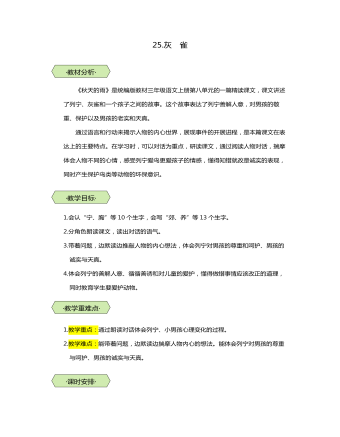
统编版三年级语文上第25课灰雀教学设计教案
《秋天的雨》是统编版教材三年级语文上册第八单元的一篇精读课文,课文讲述了列宁、灰雀和一个孩子之间的故事。这个故事表达了列宁善解人意,对男孩的敬重、保护以及男孩的老实和天真。通过语言和行动来揭示人物的内心世界,展现事件的开展进程,是本篇课文在表达上的主要特点。在学习时,可以对话为重点,研读课文,通过阅读人物对话,揣摩体会人物不同的心情,感受列宁爱鸟更爱孩子的情感,懂得知错就改是诚实的表现,同时产生保护鸟类等动物的环保意识。 1.会认“宁、胸”等10个生字,会写“郊、养”等13个生字。2.分角色朗读课文,读出对话的语气。3.带着问题,边默读边推敲人物的内心想法,体会列宁对男孩的尊重和呵护、男孩的诚实与天真。4.体会列宁的善解人意、循循善诱和对儿童的爱护,懂得做错事情应该改正的道理,同时教育学生要爱护动物。 1.教学重点:通过朗读对话体会列宁、小男孩心理变化的过程。2.教学难点:能带着问题,边默读边揣摩人物内心的想法。能体会列宁对男孩的尊重与呵护、男孩的诚实与天真。 2课时









